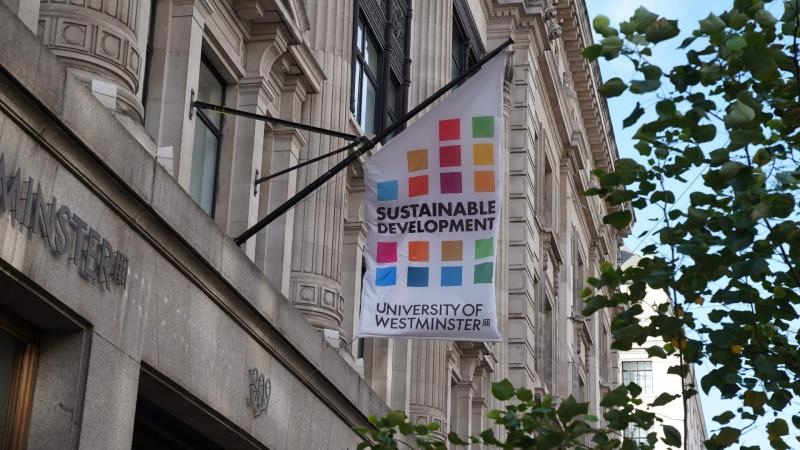The University of Westminster has launched a new group of University-wide elective modules to enable students at all levels to work together with the support of academics to find solutions to global challenges and contribute to the United Nations’ Sustainable Development Goals (SDGs). Kicking off in January 2026, each initiative sets out to boost career-readiness and contribute to a more sustainable, equitable and healthier society.

The Vertically Integrated Projects for Sustainable Development (VIPs) give students and academics the chance to collaborate on research aligned with the SDGs and gain valuable hands-on experience. Every project is open to students from across all levels and disciplines, giving everyone within the University community the opportunity to bring their own unique perspective to each initiative and build their networks beyond their course.
Led by academic directors, Westminster’s first stellar line up of VIPs include the Cavendish Living Lab, Co-Creating Rwanda’s Future, the Democratic Education Network, Language Matters in Migration, StreetLaw, Westminster Genome Health Hub and Westminster Waves.
The Cavendish Living Lab is led by Dr Pooja Basnett and Dr Linda Percy, Senior Lecturers and Co-Course Leaders for Westminster’s Biological Sciences BSc Honours course, Dr Dipankar Sengupta, Senior Lecturer in Health Data Analytics, Dr Caroline Smith, Assistant Head of the School of Life Sciences, and Dr Luca Cacciolatti, Senior Lecturer in Innovation and Marketing. The project gives students the chance to design innovative solutions to real-world global challenges through five strands: urban food growing, bioplastic production, water management, fast fashion awareness and health and wellbeing.
The Co-Creating Rwanda’s Future initiative is led by Darrell Kofkin, Lecturer in Social Entrepreneurship and Entrepreneurship, and offers students the opportunity to support the development of leading young fashion entrepreneurs in Rwanda. In association with the British High Commission in Rwanda, students will work with stakeholders, including Westminster alumna and British High Commissioner in Rwanda Alison Thorpe, and develop a range of creative communication such as podcasts to support the project.
The Democratic Education Network is led by Dr Farhang Morady, Reader in International Development, and gives students a space to explore global citizenship, democratic engagement and international development by working in interdisciplinary teams to research pressing social and sustainability challenges, create blogs, digital stories and policy briefs, and organise public-facing events.
For the Language Matters in Migration project students will be led by Olga Nunez Pineiro, Senior Lecturer at the University of Westminster, and be tasked to produce translations of exhibition material for the Migration Museum in London.
StreetLaw is a community outreach project led by Dr Stuart Peck, Solicitor and Lecturer on Westminster’s Legal Practice LLM course. Students involved will research, design and deliver presentations on key legal topics such as knife crime, sexting, police powers or climate change to school pupils and other community groups across London.
Westminster Genome Health Hub is led by Dr Moonisah Usman, Senior Lecturer in Centre for Education and Teaching Innovation (CETI), Professor Emanuela Volpi, Professor of Molecular Cytogenetics and Chromosome Biology, Dr Rosa Schiano-Phan, Reader in Architecture and Environmental Design, and Dr Maria Woloshynowych, Chartered Psychologist and Senior Lecturer. The project brings together students and academics to research into how biomedical, environmental and social factors interact to influence DNA and lifelong wellbeing.
Finally, students will have the chance to get involved with Westminster Waves, a University-wide digital community radio station. Led by Eleanor Roseblade, Senior Lecturer in Media, the station provides opportunities for students to gain practical hands-on experience and learn how broadcasting can amplify diverse voices, foster collaboration and connect communities.
Westminster’s focus on career readiness is driven by its mission of helping its students from a variety of backgrounds realise their full potential. Supporting Westminster students with work-related opportunities and connections to the local community, such as through the VIPs, is a key part of the University’s aim for Zone29, its new home for careers and enterprise, which is due to open in Spring 2026.
Head of the CETI Dr Andy Pitchford said: “This is a really bold move for the University. We are bringing genuinely interdisciplinary learning into our elective space and giving students agency to use their imagination to address global challenges. Vertically Integrated Projects are also supported by an international consortium, led by Georgia Tech University, and we will be benefitting from connections and support from another 60 universities worldwide, who are part of this exciting and growing community.”
Morgan Lirette, Sustainable Development Advisor at Westminster, added: “It’s a dream come true to bring VIPs to our students. Guided by our brilliant colleagues, students will develop core competencies for sustainable development, practicing innovation and working together as sustainable citizens.”
The VIPs directly contribute to the United Nations Sustainable Development Goals, specifically 4: Quality Education, 9: Industry, Innovation and Infrastructure and 17: Partnership for the Goals. Since 2019, the University of Westminster has used the SDGs holistically to frame strategic decisions to help students and colleagues fulfil their potential and contribute to a more sustainable, equitable and healthier society.
Learn more about Westminster’s Vertically Integrated Projects for Sustainable Development.


